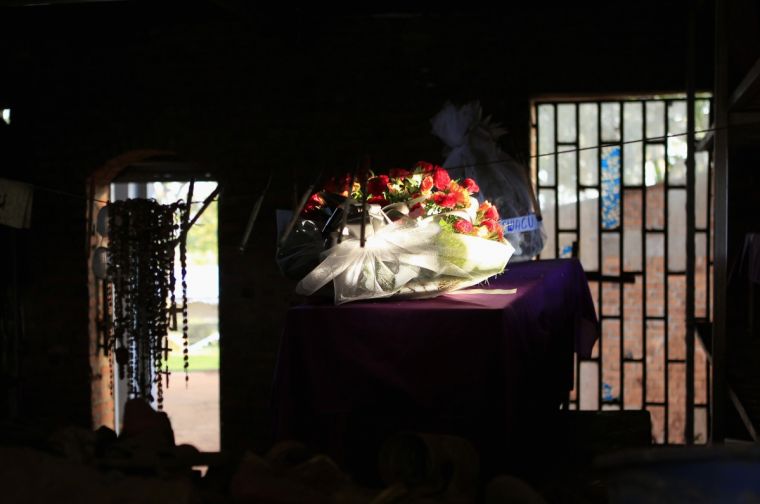A slap on the wrist: Justice, from the Holocaust to Rwanda to Nineveh
Any day now, Theoneste Bagosora, a mastermind of the 1994 Rwandan genocide, will be eligible to apply for early release. In 2011, Bagosora's life-in-prison verdict was reduced to 35 years by Theodor Meron, the American judge heading the international court administering sentences; the genocidaire has now served two thirds of his sentence. Meron has been criticised for freeing other architects of the slaughter that killed 70 per cent of the Tutsi ethnic group living in Rwanda.

In the words of a survivor who was eight years old when he saw his parents and four siblings hacked to death: 'This is just a slap on the wrist of the ones who wanted to eliminate my people.' He continued, 'It is not easy to heal while we know there are not enough perpetrators behind bars.'
In his forthcoming book about the Rwandan genocide, UK academic Andrew Wallis says Meron has narrowed the interpretation of 'specific direction', the direct intention to commit a crime as it applies to commanding officers. He implies there are political motives for raising the bar, reducing the likelihood that US military commanders can be liable for atrocities committed in Iraq and Afghanistan. The same issue, concerning the conduct of British soldiers during the Northern Ireland Troubles and in Iraq, recently prompted the UK government to act.
Yet, it cannot be beyond the capacity of legislators and jurists to formulate a legal definition that protects soldiers from 'vexatious' prosecution or witch-hunts, without making it increasingly difficult to prosecute those suspected of contemporary genocides, such Islamic State's attempt to eliminate the Christians and Yezidi people of Iraq. It is vital to maintain the integrity of the Genocide Convention. Moreover, hundreds of suspected war criminals – Rwandan, Bosnian Serb, and Nazi – remain at liberty, many of them in North America and Europe.
This loss of appetite for holding genocidal killers to account is not new: according to Elizabeth Barry White of the US Holocaust Memorial and Museum, high-ranking Nazi officers were charged with lesser offences because proving direct responsibility for the killing was hard within narrow German jurisdiction. By 1960, murder and abetting murder were the only Nazi-era crimes that prosecutors could act on. Equally important, in the 1950s and 1960s, Germany preferred not to consider its collective complicity. 'In many cases, German perpetrators of National Socialist crimes simply returned to their normal lives and professions in German society,' notes the museum website.
Moreover, justice requires resources. Jens Rommel, the Chief Prosecutor of Germany's Central Office for the Investigation of Nazi Crimes, admits: 'There are entire death camps we haven't yet been able to get to.' The Office's staff has shrunk from 120 in the 1960s to eight active prosecutors today. Still, the Simon Wiesenthal Center gives Germany top marks for prosecuting suspects. In contrast, Ukraine has never investigated a single one of its citizens for involvement in the extermination of 1 million Jewish Ukrainians.
The cause of justice is not helped by the cost and lack of productivity of some special tribunals. The Rwanda trials cost $2 billion, resulting in 50 trials of which 29 led to convictions, while Cambodia's tribunal cost $300 million; in 2018 it finally delivered a judgment against two Khmer Rouge leaders, 40 years after the killing fields.
Some critics question how valuable proceedings are after so many decades. Yet, if you interview genocide survivors, as I have in Bosnia, Rwanda, Darfur and Iraq, you know closure is impossible without official recognition that an appalling injustice was done to a particular group of people. My charity, Network for Africa, trains local NGO staff and community leaders to provide trauma counselling in post-conflict societies. Helping people manage their flashbacks is essential to healing. But so is justice.
Justice is also a matter of principle: given the opportunity, and a credulous media, people too readily deny genocide has taken place. The Hungarians cannot open their Holocaust Museum because the government refuses to admit Hungarian participation; Lithuania celebrates as heroes the paramilitaries involved in killing 95 per cent of the Jewish population; Poland changed the law to forbid the mention of Polish deathcamps. In July this year, Russia vetoed a UN resolution on Srebrenica, protecting its clients, the Bosnian Serbs. And the Japan Times has changed the definition of 'comfort women' from 'those who were forced to provide sex for Japanese troops' to include women who worked in brothels out of choice.
What hope is there that survivors of recent genocide in Iraq, the Christians and the Yezidis, will see their persecutors, Islamic State, arrested and charged with genocide? There is no political will on behalf of the Iraqi government or the international community to recognise, let alone prosecute, IS for its systematic intention to eliminate the Christians and the Yezidi. Until Iraq legislates for a specific crime of genocide, there will be no domestic prosecutions of the IS members who enslaved Christian and Yezidi women, killed their men, and destroyed their communities between 2014 and 2017.
Justice may be overdue, costly and inadequate, but it is a clear warning for future generations, and a means of puncturing our current complacency. Watering down the requirements for culpability helps no one but the perpetrators, while leaving the survivors feeling disbelieved.
Rebecca Tinsley's charity, Network for Africa, trains local NGO staff to give trauma counselling.











